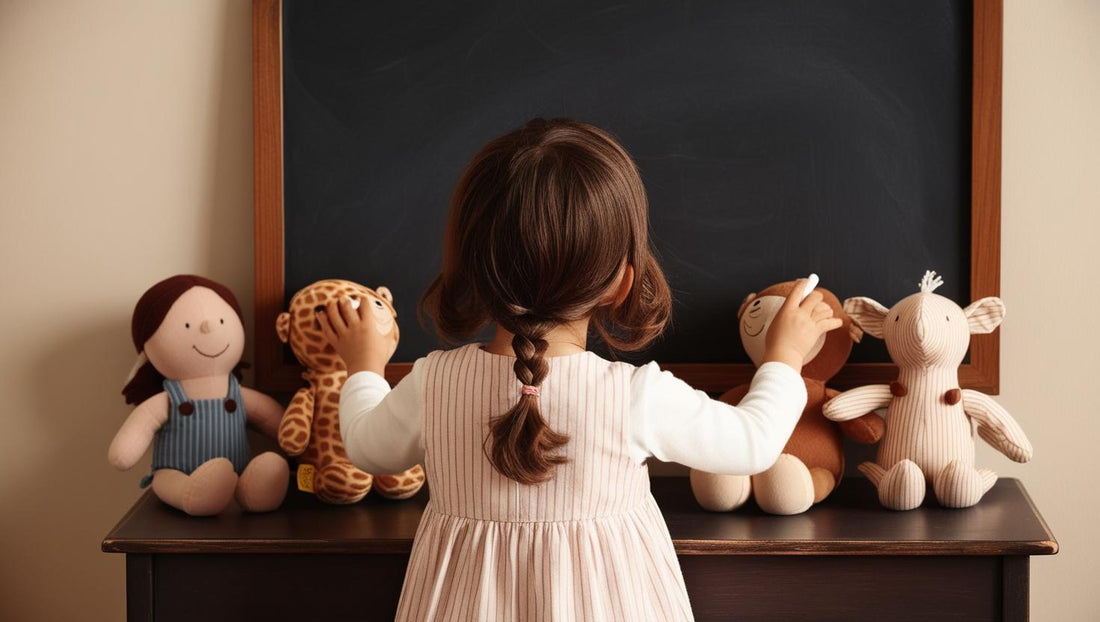
The Power of Play: How Role Play Shapes Children's Development
Share
The Power of Play: How Role Play Shapes Children's Development
Childhood is a world of imagination, where a cardboard box becomes a spaceship, a blanket transforms into a superhero cape, and a child playing "teacher" learns more than just how to take attendance. Role play is more than just fun—it is a vital part of a child’s cognitive, social, and emotional development. Let’s dive into the science behind why pretend play is crucial for little minds to grow and flourish.
1. Cognitive Growth: Building Brain Power
When children engage in role play, they are doing more than acting out scenarios—they are constructing complex cognitive skills. According to research published in the Journal of Cognitive Development, pretend play enhances executive function, which includes memory, problem-solving, and self-regulation. When a child pretends to be a doctor, they are not only memorizing medical terms (real or imagined) but also developing sequencing skills and logical thinking as they "diagnose" and "treat" their patient.
A study from the National Association for the Education of Young Children (NAEYC) also found that children who frequently engage in role play demonstrate stronger language skills. Acting out scenarios helps them expand their vocabulary, improve sentence structure, and express thoughts more clearly.
2. Emotional Development: Expressing and Understanding Feelings
Role play provides a safe space for children to explore emotions and develop empathy. When children step into different roles—whether it's a parent, teacher, or firefighter—they learn to see the world from another perspective. Research in Early Childhood Research Quarterly highlights that children who engage in role play show a greater understanding of emotions and social situations.
For example, playing "house" allows children to experience caregiving roles, helping them process their own feelings and understand the needs of others. This fosters emotional intelligence, which is essential for future relationships and well-being.
3. Social Skills: Learning to Communicate and Collaborate
Social interaction is at the heart of role play. Whether they are pretending to run a shop, play restaurant, or act as superheroes saving the world, children are negotiating roles, taking turns, and resolving conflicts.
A study from the American Journal of Play found that children who engage in pretend play with others develop stronger teamwork and conflict-resolution skills. They learn cooperation, patience, and compromise—skills that are essential in both childhood and adulthood.
4. Creativity and Problem-Solving: Thinking Outside the Box
Pretend play encourages children to think creatively and approach challenges in new ways. When they pretend to be explorers searching for hidden treasure, they’re developing problem-solving skills by figuring out where to look, what tools to "use," and how to work together.
According to psychologist Lev Vygotsky, role play fosters creativity because it allows children to experiment with different scenarios and solutions in a risk-free environment. This type of imaginative thinking lays the foundation for innovative problem-solving later in life.
Encouraging Role Play at Home
Now that we know how beneficial role play is, how can we encourage it? Here are some simple ways:
-
Provide dress-up clothes and props to inspire imagination.
-
Encourage open-ended storytelling where children create their own narratives.
-
Join in! Play along as a customer at their pretend shop or a patient at their "clinic."
-
Offer toys that encourage role play, such as play kitchens, dolls, or DIY sets.
Role Play in Mademoiselle Sunshine Boxes
At Mademoiselle Sunshine, we believe in fostering creativity and development through play. That’s why our subscription boxes include fun and interactive elements—whether it’s a beauty-themed spa set, a mini DIY project, or accessories that inspire imaginative adventures. Every product is thoughtfully selected to ensure safe, fun, and educational play that nurtures young minds.
Encouraging role play isn’t just about keeping kids entertained—it’s about giving them the tools to grow into confident, creative, and empathetic individuals. So next time your little one asks you to "play along," remember: you’re not just joining a game, you’re supporting their development in the most wonderful way. 💛
References:
-
Bergen, D. (2002). "The Role of Pretend Play in Children's Cognitive Development." Early Childhood Research & Practice.
-
Singer, D. G., & Singer, J. L. (2009). The House of Make-Believe: Children's Play and the Developing Imagination. Harvard University Press.
-
Lillard, A. S. (2013). "Pretend Play and Cognitive Development." American Journal of Play.
-
Vygotsky, L. S. (1978). Mind in Society: The Development of Higher Psychological Processes. Harvard University Press.





